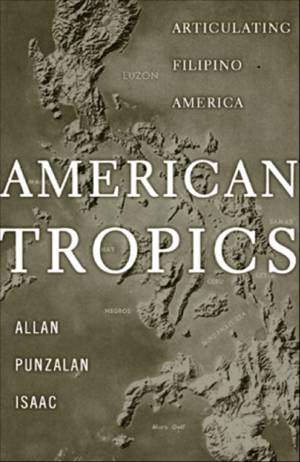
- Afhalen na 1 uur in een winkel met voorraad
- Gratis thuislevering in België vanaf € 30
- Ruim aanbod met 7 miljoen producten
- Afhalen na 1 uur in een winkel met voorraad
- Gratis thuislevering in België vanaf € 30
- Ruim aanbod met 7 miljoen producten
Zoeken
Omschrijving
In 1997, when the New York Times described Filipino American serial killer Andrew Cunanan as appearing "to be everywhere and nowhere," Allan Punzalan Isaac recognized confusion about the Filipino presence in the United States, symptomatic of American imperialism's invisibility to itself. In American Tropics, Isaac explores American fantasies about the Philippines and other "unincorporated" parts of the U.S. nation that obscure the contradictions of a democratic country possessing colonies.Isaac boldly examines the American empire's images of the Philippines in turn-of-the-century legal debates over Puerto Rico, Progressive-era popular literature set in Latin American borderlands, and midcentury Hollywood cinema staged in Hawai'i and the Pacific islands. Isaac scrutinizes media coverage of the Cunanan case, Boy Scout adventure novels, and Hollywood films such as The Real Glory (1939) and Blue Hawaii (1961) to argue that territorial sites of occupation are an important part of American identity. American Tropics further reveals the imperial imagination's role in shaping national meaning in novels such as Carlos Bulosan's America Is in the Heart (1946) and Jessica Hagedorn's Dogeaters (1990), Filipino American novels forced to articulate the empire's enfolded but disavowed borders.Tracing the American empire from the beginning of the twentieth century to Philippine liberation and the U.S. civil rights movement, American Tropics lays bare Filipino Americans' unique form of belonging marked indelibly by imperialism and at odds with U.S. racial politics and culture.Allan Punzalan Isaac is assistant professor of English at Wesleyan University.
Specificaties
Betrokkenen
- Auteur(s):
- Uitgeverij:
Inhoud
- Aantal bladzijden:
- 256
- Taal:
- Engels
- Reeks:
Eigenschappen
- Productcode (EAN):
- 9780816642748
- Verschijningsdatum:
- 1/12/2006
- Uitvoering:
- Paperback
- Formaat:
- Trade paperback (VS)
- Afmetingen:
- 146 mm x 231 mm
- Gewicht:
- 317 g

Alleen bij Standaard Boekhandel
+ 86 punten op je klantenkaart van Standaard Boekhandel
Beoordelingen
We publiceren alleen reviews die voldoen aan de voorwaarden voor reviews. Bekijk onze voorwaarden voor reviews.











